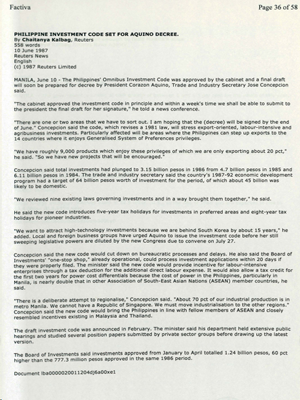PHILIPPINE INVESTMENT CODE SET FOR AQUINO DECREE
[Reuters]
Published date: 10th Jun 1987
10 June 1987
Reuters News
English
(c) 1987 Reuters Limited
MANILA, June 10 – The Philippines’ Omnibus Investment Code was approved by the cabinet and a final draft will soon be prepared for decree by President Corazon Aquino, Trade and Industry Secretary Jose Concepcion said.
“The cabinet approved the investment code in principle and within a week’s time we shall be able to submit to the president the final draft for her signature,” he told a news conference.
“There are one or two areas that we have to sort out. I am hoping that the (decree) will be signed by the end of June.” Concepcion said the code, which revises a 1981 law, will stress export-oriented, labour-intensive and agribusiness investments. Particularly affected will be areas where the Philippines can step up exports to the 14 countries where it enjoys Generalised System of Preferences privileges.
“We have roughly 9,000 products which enjoy these privileges of which we are only exporting about 20 pct,” he said. “So we have new projects that will be encouraged.”
Concepcion said total Investments had plunged to 3.15 billion pesos in 1986 from 4.7 billion pesos in 1985 and 6.11 billion pesos in 1984. The trade and industry secretary said the country’s 1987-92 economic development program had a target of 64 billion pesos worth of Investment for the period, of which about 45 billion was likely to be domestic.
“We reviewed nine existing laws governing investments and in a way brought them together,” he said.
He said the new code introduces five-year tax holidays for investments in preferred areas and eight-year tax holidays for pioneer industries.
“We want to attract high-technology Investments because we are behind South Korea by about 15 years,” he added. Local and foreign business groups have urged Aquino to issue the investment code before her still sweeping legislative powers are diluted by the new Congress due to convene on July 27.
Concepcion said the new code would cut down on bureaucratic processes and delays. He also said the Board of Investments’ “one-stop shop,” already operational, could process investment applications within 20 days if they were properly filed. The minister said the new code would provide incentive for labour-intensive enterprises through a tax deduction for the additional direct labour expense. It would also allow a tax credit for the first two years for power cost differentials because the cost of power in the Philippines, particularly in Manila, is nearly double that in other Association of South-East Asian Nations (ASEAN) member countries, he said.
“There is a deliberate attempt to regionalise,” Concepcion said. “About 70 pct of our industrial production is in metro Manila. We cannot have a Republic of Singapore. We must move Industrialisation to the other regions.” Concepcion said the new code would bring the Philippines in line with fellow members of ASEAN and closely resembled incentives existing in Malaysia and Thailand.
The draft investment code was announced in February. The minister said his department held extensive public hearings and studied several position papers submitted by private sector groups before drawing up the latest version.
The Board of Investments said investments approved from January to April totalled 1.24 billion pesos, 60 pct higher than the 777.3 million pesos approved in the same 1986 period.






